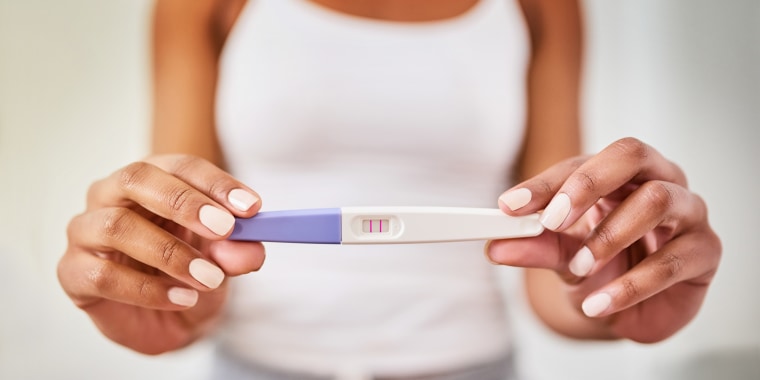Trying to conceive may feel like an emotional roller coaster, especially in the days leading up to getting your period. As you wait, every symptom might feel like early signs of pregnancy.
You may wonder what morning sickness feels like — and how to distinguish it from indigestion caused by the cheeseburger you ate?
Is that spotting on your underwear implantation bleeding, or just the early start of your period?
How soon after having unprotected sex might you start to feel pregnant?
"Some women feel pregnant even before they miss their periods, but most commonly, symptoms like nausea, sore breasts and fatigue will start sometime after they miss it," Dr. Mary Jane Minkin, clinical professor of obstetrics and gynecology at Yale University, tells TODAY.com.
Minkin and Dr. Kecia Gaither, director of perinatal services at NYC Health and Hospitals/Lincoln tell TODAY.com what pregnancy symptoms to look for and the best time to take a pregnancy test.
Early Signs Of Pregnancy
Early signs of pregnancy can include implantation bleeding and morning sickness.
What is implantation bleeding?
How do you know implantation bleeding isn't just your period? Assuming your cycle is regular, implantation bleeding typically can be seen about 7 to 10 days before your expected menstrual cycle.
"As the fertilized egg becomes embedded into the uterine lining, women may see a small amount of blood released which can last anywhere from a few hours to two days," Gaither says.
Gaither adds that you might also experience symptoms such as breast tenderness, nausea, vomiting, and increased sensitivity to smell.
It is important to always report any bleeding during pregnancy to your doctor.
"Unfortunately there is no definitive test of implantation bleeding, it's sort of a diagnosis of exclusion," Minkin says.
For a patient with bleeding early in pregnancy, Minkin will usually perform a blood test to check hCG levels.
"In those early days and weeks, the hormone level should rise substantially if things are healthy, otherwise it may indicate a pregnancy that is not developing well," she says.
What does morning sickness feel like?
Despite the name, morning sickness can strike a woman at any point during the day, although most women experience it during the earlier hours. Women may find it difficult to eat and may also have a strong aversion to certain smells.
"If you feel extremely nauseous, tell your doctor, because we do have safe medications to treat it," Minkin says.
According to Gaither, other symptoms will often kick into gear about three to four weeks after conception. These include a heightened sense of smell, breast tenderness, vaginal discharge, dizziness and fatigue.
Some people think having more morning sickness means a healthier pregnancy, but both Minkin and Gaither say there is no truth to this.
"Some people may be miserable with morning sickness while others aren't, because just like every woman is different, every pregnancy is different," Gaither says, adding that for most women, morning sickness goes away by the 12 or 14-week mark.
If you're in the throes of it, keep your eye on the prize: Your adorable future baby will be worth all the Saltines and sips of ginger ale.
When should I take a pregnancy test?
Minkin advises her patients to check as early as possible, pointing out that some tests, like the First Response Early Result Pregnancy Test, can tell you up to six days before the day your period is due.
"I always encourage folks trying to become pregnant to do everything to avoid smoking, drinking, drug use, and to take a prenatal vitamin with folic acid, but nothing reinforces good behavior like a positive test, so if you are trying to conceive, and you want to know at the earliest possibility, an early test can be very helpful," Minkin tells TODAY.com.
The first urine of the day has the highest levels of hCG, so many women test upon waking up.
But there is a caveat about timing: According to First Response, because the pregnancy hormone (called human chorionic gonadotropin, or hCG) continues to increase significantly in the early days and weeks, the test only accurately detects pregnancy in 76 percent of women when taken five days before their expected period. However, when taken on the period's due date, detection jumps to greater than 99 percent.
"If you take it early and it is negative, it makes sense to repeat it a few days later," Minkin says.
With home pregnancy tests, false negative results (the test says you aren't pregnant, but you actually are) are much more common than false positives (the test says you are pregnant, but future tests are negative). That said, false positive pregnancy results can happen.
According to the Mayo Clinic, "A false-positive might happen if you had a pregnancy loss soon after the fertilized egg attached to your uterine lining (biochemical pregnancy) or you take a pregnancy test too soon after taking a fertility drug that contains hCG."
Regardless of the home test, your provider will order a blood test to confirm your pregnancy.
Related video:
